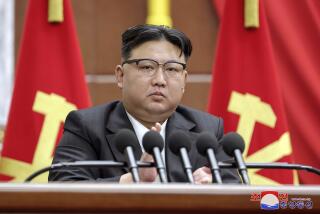N. Korea Pledges to Work Toward Denuclearization
- Share via
BEIJING — A fresh round of six-nation talks aimed at ending North Korea’s nuclear weapons program got underway in the Chinese capital today, with the Pyongyang government pledging to work toward denuclearizing the Korean peninsula and the U.S. offering assurances that it had no plans to attack the impoverished communist country.
“The fundamental thing is to make real progress in realizing the denuclearization of the Korean peninsula,” North Korean Vice Foreign Minister Kim Gye Gwan said in opening remarks broadcast live on Chinese television. “This requires very firm political will and a strategic decision of the parties concerned that have interests in ending the threat of nuclear war. We are fully ready and prepared for that.”
After three rounds of mostly fruitless talks, Pyongyang walked away from the bargaining table more than a year ago. It agreed to return this month after South Korea dangled a promise of energy aid and the U.S. pledged respect for North Korea’s sovereignty. The American delegation reaffirmed that stance today.
“We view the DPRK’s sovereignty as a matter of fact,” U.S. Assistant Secretary of State Christopher Hill said in his opening statement, referring to North Korea by its official name, the Democratic People’s Republic of Korea. “The United States has absolutely no intention to invade or attack.
“These talks are at a critical juncture,” Hill added. “We do not have the option of walking away from this problem.”
On Monday, members of the American delegation held a rare side discussion with their North Korean counterparts. Although Kim and Hill have met before, including a three-hour dinner in Beijing this month, the American side described Monday’s encounter between Hill and Kim as a get-acquainted meeting during which they set the terms of the discussions.
“It was a very businesslike exchange of information focused on the way forward,” said White House spokesman Scott McClellan. “These weren’t negotiating sessions; these were simply discussions to talk about modalities and things of that nature.”
During the 75-minute meeting, U.S. officials said, the Americans asked the North Koreans to clarify what they meant when they talked about a “nuclear-free” Korean peninsula.
“We’re trying to create a common lexicon, to make sure they’re not talking about something totally at odds with what we’re talking about,” said a senior U.S. official in Beijing who briefed reporters on condition of anonymity.
Another issue U.S. officials are concerned about is whether Pyongyang would agree to give up all its nuclear activities. In addition to North Korea’s acknowledged plutonium program, the U.S. has accused the government of having a uranium-enrichment program that could be used to make fuel for bombs.
“We’ve really got to have clarity on those issues,” said the U.S. official. “It doesn’t make sense to close the back door when you have the front door open.”
Though few observers expect a final deal to be reached at these talks, participants are hoping that enough progress will be made to justify another round. In a bid to boost the chances for a breakthrough, this time no ending date for discussions has been set. Previous sessions ended after a set period of three days.
“We do have an agreement to stay here as long as it takes to get things done,” the U.S. official said. “We really need to show the world the six-party process can get us somewhere. Everybody’s committed to getting something done in this session.”
In addition to the United States and North Korea, the talks include China, South Korea, Japan and Russia. As host to the meetings, the Chinese urged everyone to exercise flexibility and practicality.
“The talks will probably encounter various difficulties and disturbance,” Chinese Foreign Minister Li Zhaoxing said. “Adhering to the process of peaceful talks is the sole correct choice.”
More to Read
Sign up for Essential California
The most important California stories and recommendations in your inbox every morning.
You may occasionally receive promotional content from the Los Angeles Times.













